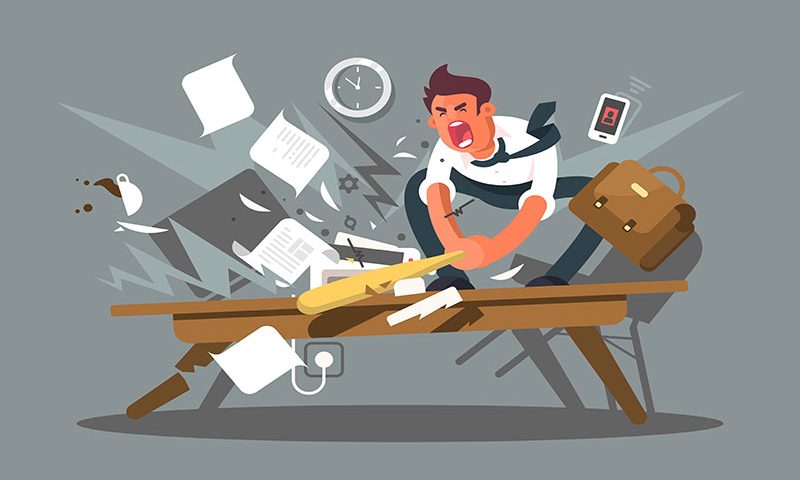
The 7 chakras and how to unlock them
August 24, 2017
Can meditation improve your libido?
September 1, 2017Anger Management – How to deal with anger and stress

Anger Management – How to Deal with Anger and Stress | Ana Heart
Everybody, at some point in life, will have the misfortune of experiencing bouts of anger and associated stress. If these emotions are not dealt with in an appropriate manner, they can end up wreaking havoc on your day-to-day life, meaning that it is essential you learn to identify these feelings when they crop up. Learning to identify unnecessary anger, stress and anxiety will mean that you can find a method of calming the body and mind, that works best for you personally.
In this article, we discuss a variety of effective methods to deal with anger, both short and long-term.
Identifying and Dealing with Anger
Identifying anger, is the first step towards anger management, including pinpointing the initial cause and any tell-tale signs that you are becoming angry. Your breathing may start to become heavier, due to the increase in heart rate, typically associated with the onset of anger. You may even begin to feel the tension rising throughout the body, particularly around your shoulders and the back of your neck. Removing yourself from the situation, as soon as you recognise you’re feeling angry is essential, as, often, high levels of emotion can lead to verbal outbursts that you will later regret. If you are at home or in a public place, simply remove yourself from the situation for a while, taking time to calm down. If you find yourself experiencing anger at work, it’s highly important that you remain professional even if deep down, you’re burning with rage; taking a few minutes alone to go to the bathroom will allow time to take a breather before returning in a cool, collected manner once the situation has dispersed.
After removing yourself from the situation, it’s important to help your mind and body to calm down. Count to ten while you begin to regulate your breathing by breathing in lightly, and out heavily. Sometimes, screaming aloud may feel necessary to let out any pent up emotion; as long as this is done in private if possible, there is no harm to this method.
Now you are feeling completely calm, you will be able to think about the situation with rationale, without any harsh emotions clouding your judgment. Identifying at least three reasons you believe you felt angry, including the different stages of the anger, and how it was built up, can often prove to be extremely helpful. Although anger is often fuelled, particularly in the work place, by someone’s comments or actions, the route of the cause may actually be down to something as simple as overtiredness, or additional factors, such as stress at home. Really think about the different reasons as to why you’re feeling angry. Writing them down can often prove an effective way of venting emotions if you’re in a situation where it’s difficult to speak out loud.
Once you are satisfied that your anger has depleted, you can return to the situation and explain to others the cause of your anger, making it clear why you had to leave abruptly. if discussing the scenario with those involved seems a little overwhelming at first, and you are concerned that talking it through may cause the anger to return, try talking through your feelings with a close friend, or colleague. If you feel the route of the anger is a long-term situation, it can be helpful to consider mediation, which is where parties involved in a dispute seek the help from a mediator, in attempt to resolve the conflict.
Long-term Anger Management
Now you have learned how to identify anger, and how to deal with it when it does come about, you will be able to start making small lifestyle changes that will help you to manage and reduce both long and short-term anger and stress, resulting in a happier, calmer version of yourself.
Look after your mind and body
Often, anger is the result of your mood being a little low, which is why striving to be the best version of yourself both physically and mentally is an important step towards the reduction of anger in your day-to-day life. Many people swear by daily exercise to manage anger, as it not only diminishes tension but also releases endorphins into the body, which are often referred to as ‘happy hormones’. You don’t have to be a fitness fanatic to start to see the benefits associated with daily exercise; something as low-intensity as yoga or meditation will relieve anger and stress, just as well.
When working towards a healthier routine, you may also want to consider adapting your lifestyle and sleeping habits, too. Not getting enough sleep is often one of the underlying causes of feeling angry, and stressed in everyday life. Without the luxury of a full-nights sleep behind you, your tolerance for little things that can trigger anger can be much lower, meaning even the small things stress you out if you haven’t gotten enough sleep. Each night, making a point of switching off all technology at least an hour before you plan to go to sleep, can help the body to wind down. Ideally, you should also avoid caffeine, including tea, coffee, and chocolate for at least 6 hours before bed.
It’s not only over tiredness that has a role to play in the onset of anger, stress, and anxiety. Your diet is a huge contributing factor, with recent studies showing that a lack of B vitamins is likely to increase feelings of anxiety and even, depression. Every day, take the time to ensure you have consumed enough water, too, as drinking that all important H2O is key to flushing toxins out of your system. Avoid fatty, sugary and salty foods if you can, as they do not only make the body feel unhealthy but can also contribute to weight gain and skin blemishes, both of which can knock your confidence and consequently, lead to long-term, to anger and stress.
Embrace your inner artist
Getting creative is found to be one of the best ways to deal with anger and stress. If you’re feeling unhappy, expressing your emotions through art can often prove much more effective than talking through them aloud. Art therapy, a form of expressive therapy that uses creative techniques, is used widely today as a tool for combatting stress, anxiety, and depression, consequently improving one’s mental well-being.
Talk it through
The tried and tested method of venting emotions out loud, still to this day proves to be one of the most effective. Talking through your feelings with someone you trust is a sure way to begin to deal with built up anger and stress; ensuring that emotions are not getting bottled up will make stressful situations much easier to deal with when they do arise. Learn to speak openly, and with honesty. If you don’t feel comfortable talking to the people around you, why not try seeing a therapist once a month, for example. Remember, a therapist is there only to listen and offer advice; they will not judge you, for anger is natural.
No matter when you experience anger, identifying the cause of the emotion as soon as possible is the best way to begin to calm down both body, and mind. For a healthier and happier you, try upping your physical activity each day and ensure you stick to a healthy, balanced diet. For a low intensity work out, set up a comfy yoga mat and spend 10 minutes each day practicing some basic postures, to begin to encourage mental and physical wellness throughout the body.

